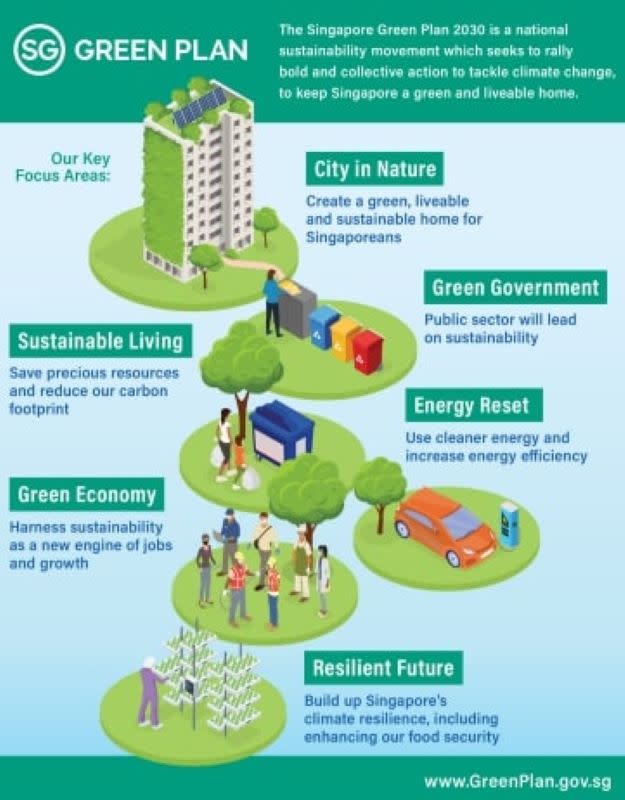Everything To Know About Green Financing & Singapore Sovereign Green Bonds

So what is a green bond? And is it something you would want to invest in? Read on to find out more about this new initiative and framework, and the latest investment opportunity in town.
What is a Green Bond?
A green bond is just like any other bond, a debt obligation typically asset-linked and backed by the issuer’s balance sheet. The ‘green’ in its name should give its main purpose away, as green bonds strive to raise funds for environmental and sustainability initiatives and developments.
To summarise, they are financial instruments that investors can buy in order to receive payouts while the proceeds raised from the bonds would be directed towards sustainable development projects.
Types of Green Bonds
There are many types of green bonds worldwide, and they include, but are not limited to the following:
1) “Use of Proceeds” bond
This is a standard debt obligation, and is secured by assets. An example of such a bond is the Barclays Green Bond.
2) “Use of Proceeds’ revenue bond
It is secured by the revenue generated from the issuer’s specific activities and projects, such as the building of a bridge.
3) “Project” bond
This type of bond is secured by the assets of a business project, as well as its balance sheet. One instance of this bond or fund type would be the Invesco Solar ETF.
4) “Securitisation (ABS)” bond
The Securitisation (ABS) bond is secured by assets and cash flows from a pool of grouped business projects. Tesla Energy is one such company, whose solar assets are backed by the cash flows from power purchase agreements.
Introduction To Green Financing

You may be wondering, what is green financing? Green financing is a way to promote sustainable initiatives and developments that have objectives pertaining to the environment and sustainability. This works by encouraging investments into such green projects instead of regular investment and businesses. By prioritising these sustainable projects, higher financial flow can go into green bonds and other green financial products such as sustainable investment funds and more.
Many may be concerned about the returns of green investments and financing, as it seems that firms with a higher emphasis on sustainability could incur higher costs of production. Hence, a key part and consideration of green financing is to balance out between sustainability and returns, ensuring that opportunities to boost both return rates and sustainability benefits are seized.
Singapore Taps Into Green Financing
The Singapore Green Plan 2030, also known as Green Plan, was a movement released by the government in 2021 to strengthen our sunny island’s national agenda on sustainable development.
In the next few years, concrete targets and steps have been laid out to advance sustainability efforts from all sectors, so that we can be better positioned to fulfill our commitments under the UN 2030 Sustainable Development Agenda and Paris Agreement.

Source: MOF
As environmental concerns as well as opportunities rise in prominence not only in Singapore but globally, the Singapore government and Ministry of Finance have been working on the development of the Singapore Green Bond Framework, as announced during Budget 2022 in February.
Now that the Singapore Green Bond Framework has been finalised and publicised, the issuance of its first sovereign green bond is in the works, and it will be soon.
Just how large-scale will this project be? By 2030, S$35 billion worth of green bonds would have been issued, to fund public sector green projects and green finance.
The issuance of this green bonds would be carried out by the Significant Infrastructure Government Loan Act 2021, also known as Singa, a government body which would be in charge of setting out the guidelines and frameworks for both the upcoming sovereign green bond, as well as green bonds and financing offered by business and corporations locally.
Where Will The Money From Green Bonds Go Towards?
So where exactly would the funds and proceeds from the Singa green bonds raised be directed to? There will be a total of 8 categories pertaining to sustainability, which money from the green bonds would finance. They are:
Category | Examples of Eligible Expenditure | ||
|---|---|---|---|
1 | Renewable Energy | Expansion of Renewables in the National Power Grid | |
2 | Energy Efficiency | Energy Storage Systems (“ESS”) | |
3 | Green Buildings | Singapore Green Building Masterplan (“SGBMP”) | |
4 | Clean Transportation | Land Transport Master Plan 2040 | |
5 | Pollution Prevention, Control and Circular Economy | Integrated Waste Management Facility (“IWMF”) | |
6 | Sustainable Water and Wastewater Management | Singapore Water Story | |
7 | Climate Change Adaptation | Development of Coastal-Inland Flood Model to manage inland and coastal flood risks holistically | |
8 | Biodiversity Conservation and Sustainable Management of Natural Resources and Land Use | Transforming Singapore into a City in Nature |
The green bonds would be used for sustainability and environmental initiatives and efforts, in the form of building infrastructure, programmes and solutions to protect our environment, as long as they fulfil certain green criteria. An example would be the Tuas Nexus, set to be Singapore’s first integrated water and solid waste treatment facility.
The financing of projects covered within these 8 categories would allow for greater governmental support of the move towards greater sustainability and long-term growth, contributing towards the fulfilment of the Green Plan Pillars and UN Sustainable Development Goals (SDGs). Besides, it would also aid Singapore in transitioning to its goal of turning into a low carbon economy.
With the Singapore Green Bond Framework intact, more green financing in Singapore and in the ASEAN region could be encouraged and achieved, which would then hopefully lead to sustainable development and growth in our economies.
How Do I Know If This Green Bond Is Safe?

The Ministry of Finance has engaged Sustainalytics, an independent provider, to provide pre-issuance Second-Party Opinion (SPO) on the Singapore Green Bond Framework. To read more about this, you can visit either Sustainalytics or MOF's page.
China’s Green Bond Market, as the second largest in the world, has also shown that green financing can have great potential. This is done through China’s vast market size as well as their policies to advance in this direction. Although Singapore may not enjoy consumer and corporate market sizes as large as China’s, the government and various organisational bodies have cemented many plans and implementations of sustainable policies and frameworks, which could spell good news for green projects and therefore green investors.
To further ensure that the Singapore Green Bond Framework is robust, another independent provider will be engaged by the Ministry of Finance to conduct annual verification on the Framework’s impact reporting and allocation alignment, especially in the case of material changes, if any.
The Gerard Business Services Consultancy (GBSC) will be reviewing the Framework regularly to ensure its alignment with ICMA Green Bond Principles and the ASEAN Green Bond Standards, so that we can be rest assured that the Framework adheres to best practices on the market. The latest versions will also be provided on the updated websites, to increase transparency amongst green investors.
Looking For More Investment Opportunities?
Green bonds could well be a focal point for savvy investors in Singapore. However, if you are looking for other worthy investments, such as stocks, options and more, do not hesitate to check out our comprehensive guides, where you will be able to learn everything about investing.
The ValueChampion website offers guides on financial strategies and concepts, stock price analysis, as well as expert reviews on the various online brokerages and platforms in Singapore.
Read Also: Best Online Brokerages and Trading Platforms in Singapore 2022
ESG Investing Is On The Rise

Environmental, Social and Governance (ESG) investing has also been on the rise in recent years. ESG investing is a form of sustainable investing, and it focuses on how the companies deal with the environment and ecosystem, their stakeholders as well as their compliance measures.
As a relatively new branch of investing and strategy, why not head over to our article on ESG investing to equip yourself further with some basic background knowledge on what ESG is all about, so as to gain a better understanding and get started on your journey for ESG investing.
If The Green Bond Isn’t For You, How About The Singapore Savings Bond (SSB)?
If the new sovereign green bond initiative has sparked your interest in delving into bonds to form part of your investment portfolio, you could also take a look at the Singapore Savings Bond, which is a government-issued bond that is issued monthly.
Here, you can find a review on the Singapore Savings Bond (SSB) as it highlights the features, benefits and also alternatives to the SSB, and decide for yourself if it is a worthy investment to buy in, given its recent rising interest rates.
If you do indeed decide to invest in the SSB, the article also provides a step-by-step guide on how to start investing in the SSB, which could prove useful for any Singaporean investor looking to diversify their investment portfolio.
On a separate note, you can also read the article to find out about investing in bonds to prepare for the upcoming Singapore Green Bonds.
Conclusion
With sustainability being one of the main priorities of the Singapore economy in the long run and in the future, the greenification of many sectors in our economy is likely to provide huge potential for long-term growth.
As our nation moves towards the advancement of our green targets and goals, the Singapore Green Bond Framework will be here to guide green financing in Singapore, and we can look forward to infrastructure being built in efforts to strengthen our transition towards a green and sustainable economy and country for all.
Read Also:
The article Everything To Know About Green Financing & Singapore Sovereign Green Bonds originally appeared on ValueChampion.
ValueChampion helps you find the most relevant information to optimise your personal finances. Like us on our Facebook page to keep up to date with our latest news and articles.

 Yahoo Finance
Yahoo Finance 
